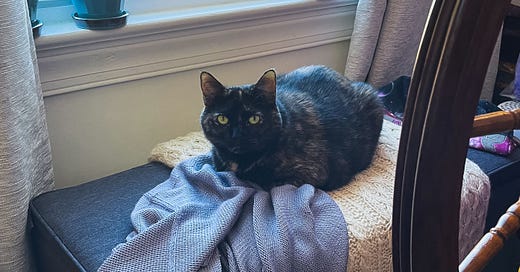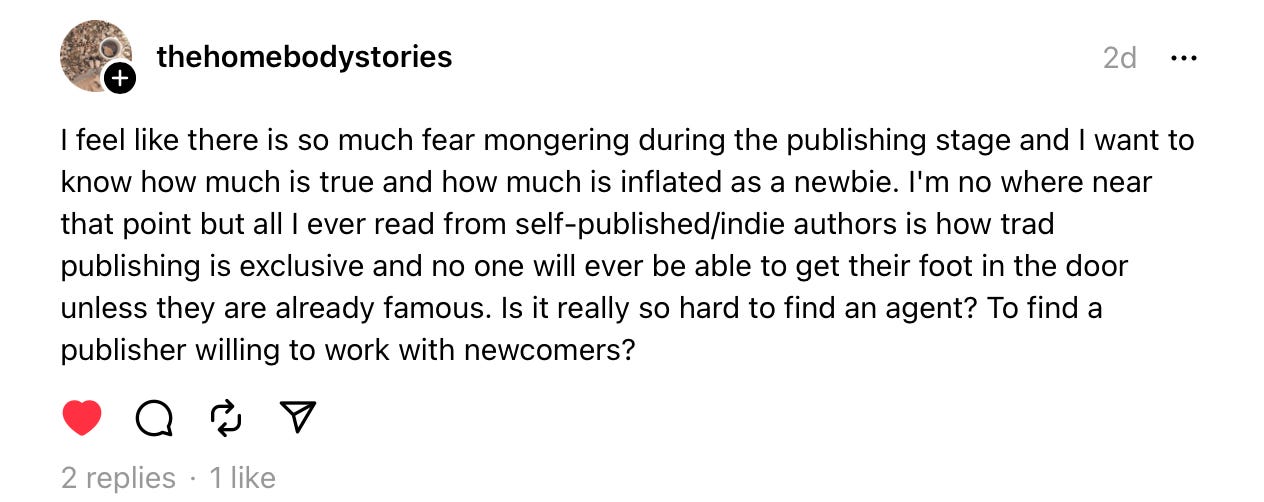Is there room for newcomers in traditional publishing?
The short answer is yes. There, saved you a whole newsletter. (But you should read it anyway. I worked hard on it.)
I got this question on Threads a few wee— months ago. And though I answered them directly, I think it’s worth an entire newsletter. Because I know this is a worry a lot of new writers share.
Here’s the question:
If you’ve also found yourself wondering if there’s even a chance for a new author to break in to the business, I have a fun activity for you: go to the bookstore. On those shelves, you’ll see lots and lots of debuts. Okay, so you might not be able to identify them by sight. That’s fair. I was just trying to give you an excuse to go to the bookstore.
But even just on this Goodreads list, which I’m pretty sure is incomplete, you can find nearly 300 books by authors debuting in 2024. A list for 2023 has about 300, too!1
When I debuted in 2012, my debut group had over 100 authors in it — just for picture books, chapter books, middle grade, and young adult. (All kidlit, basically.) Adult books? I can’t even guess how many debuts came out that year, but I’m willing to bet it was a lot.
So I think we have that out of the way, right? There are always new authors coming out with books.
Now about fame . . .
Out of these hundreds of books, most of them (in the fiction world, anyway) are probably by people who aren’t famous.2 Personally, I know of more authors who started off with no name recognition than I do authors who did.
But what about XYZ author who had a 100,000 TikTok followers before their book sold?
or . . .
What about ABC author whose family is very wealthy?
Yep. They exist. They might have had a leg up. (Or not. We shouldn’t assume.) But the fact that people generally point out the same handful of names is indicative of how few there actually are. And, I’d remind everyone that — while 100,000 followers on TikTok sounds like a lot to most of us, it’s not exactly fame numbers. Like, fame fame.
And publishers know that only a small chunk of that following will actually buy the book, anyway.
I’m not saying it doesn’t help to have a massive social media presence, a famous or wealthy family, or connections to the biggest talk shows. In some acquisitions cases, that kind of access might be one of the deciding factors of whether to purchase a book. Because there’s a good chance they can move a lot of copies. And publishing is a for-profit business.
But . . . it’s definitely not required to have any of that.
I did not have needle-moving name recognition when I got my agent. Or wealth or connections or whatever. All I had was a book. That was all my agent cared about. And that was all my publisher cared about when they acquired my first series.
Most authors I know (who were all newcomers at some point) would tell you a similar story.
So what can you, a non-famous, non-connected person do to get your foot in the door?
Write a sellable book.
A good book, of course, is always a good thing to have. Please don’t get me wrong about that. Agents and editors really do want to champion good books. But — this sucks and I’m sorry — sometimes a good book isn’t enough. Remember, publishing is for profit. They have people to pay, buildings to rent, and shareholders to make happy.3
The book needs to be both good and sellable.4
It’s not always easy to figure out how do to that.
Writing a good book is something we’re always trying to do. And when we’re first starting out, we know we need to improve. So getting good sometimes has clear milestones.5 Like, feedback from other writers becomes more complex, higher level.
Most authors accumulate a nice stack of rejections until they reach the point of writing something good enough and sellable enough. For me, that was close to 500 rejections just from agents. It was 16 completed manuscripts that either weren’t good enough, weren’t sellable enough, or (more likely) both. It wasn’t until I wrote INCARNATE (number 17) that I’d finally figured it out.
Even now, as a multi-published author, I still get rejected.
Honestly, a lot of trad authors I know would argue that it’s harder to stay in than it is to get in, because once you have a book out, you have sales numbers that will follow you around for the rest of your career.
The main thing to keep in mind, for anyone hoping to be traditionally published, is that good and sellable are both necessary.
Publishers take on a lot of financial risk when they acquire books, with advances, design, printing, distribution, and other costs that can add up fast. Not to mention the in-house editors and production teams who all need to be paid. That investment — which can be hundreds of thousands of dollars — means they need to carefully weigh the risks they take.
They need to be able to sell a book to a wide audience.
So, all that said, I’d push back on the “exclusive” descriptor, given how many authors really do come in with nothing! But for authors worried about whether there’s space for them in traditional publishing: there is.
Write the best book you possibly can. And if that book doesn’t make it, write another.
Happy writing. <3
Noting that there are some comments saying the lists have a few books that don’t belong on them, as the authors aren’t debuts. So, remember, this is just a Goodreads list. Anyone can add stuff to it. And leave stuff off. This is imperfect data. But it’s what we’ve got right now.
In nonfiction, it helps to have name recognition in the field you’re writing about. That can be a several digits of followers on a social media platform, connections in your industry, or general fame.
I’m not saying I love this. I’m just saying how it is. I have a lot of feelings about how publishing could improve — here’s a letter about it — but I think it’s important to talk about how things are, not just how we wish they were.
If there’s star power attached to the book, that math might change.
Once, an agent who didn’t know how hard I’d struggled with worldbuilding told me she liked the worldbuilding in a book I’d submitted. I mean, she still rejected the book, but that comment encouraged me so much.






On the one hand, hearing stats like anywhere from 60-95% of books die on submission—AFTER they got an agent!—is totally disheartening. On the other hand, you're right, 300 debuts a year! I mean, approximately. I was also encouraged by hearing how many authors were able to pick up shelved books (not all of them, but even 1 is a win!) after getting their first book deal.
I keep trying to remind myself not to judge myself against the outliers - the people who got 30 agent offers on their first query letter, the 18yr old with a 6 figure deal, etc.